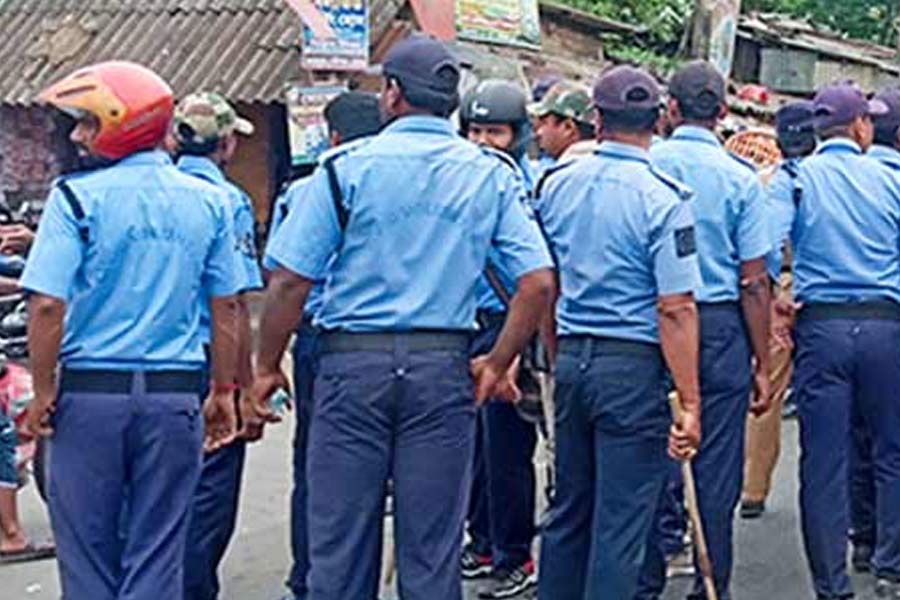The Supreme Court on Tuesday questioned the West Bengal government over hiring of civic volunteers in the state and sought data regarding their recruitment and appointment process.
A bench of Chief Justice of India D Y Chandrachud and Justices J B Pardiwala and Manoj Misra called the process of hiring as a means of granting “political patronage” to unverified people.
The top court, as a result, directed the state government to furnish details on the legal source of authority for recruitment, modalities, qualification, verifications, institutions the civic volunteers are assigned duties in and the payments made to them.
The apex court was hearing a suo motu case related to the rape and murder of a doctor at the RG Kar Medical College and Hospital in Kolkata.
The top court further directed the state government to enlist steps ensuring these volunteers were not posted at sensitive establishments such as hospitals and schools.
The top court was informed that Sanjay Roy, an accused in the rape and the murder of the Kolkata doctor was a civic police volunteer and had unrestricted access to the hospital building.
Senior advocate Karuna Nundy, appearing for a doctors' association, submitted that the state government had doubled the recruitment of civic volunteers which was a violation of a Calcutta High Court order disallowing them from discharging any law and order functions.
Nundy stated that over 1,500 such volunteers were working in the state and sought setting aside of the "Rattirer Sathi" programme that aimed to protect women working in night shifts.
Advocate Vrinda Grover, appearing for the victim's kin, said the main accused in the case was recruited as a civic volunteer despite facing criminal cases of domestic violence.
"Who recruits these civic volunteers? We need to know what are these qualifications. We need to know that such volunteers do not operate in hospitals, schools that are sensitive in nature...Otherwise this a nice process of conferring political patronage on people who are totally unverified"," the top court told senior advocate Rakesh Dwivedi, representing the West Bengal government.
Dwivedi, informed the bench that the security staff at the hospitals were now being recruited according to the Private Security Agencies (Regulation) Act 2005, akin to the rest of country.
During the hearing, Solicitor General of India Tushar Mehta, representing the CBI, submitted the fifth status report of the agency and informed that the investigation in the Kolkata rape and murder case was being carried out with "utmost seriousness".
The top court observed that the CBI report indicated that the agency was probing the role of other persons as a part of its ongoing investigation and sought a further status report within three weeks.
On the issue of the National Task Force (NTF), constituted to make recommendations over the safety and security of medical professionals, the apex court noted that it had held no meeting since the first week of September. The apex court, therefore, directed the Centre to take proactive steps to ensure that the work was completed within a reasonable period of time.
The top court noted that the West Bengal government had sanctioned a Rs 123-crore budget towards installation of CCTV cameras and other measures.
It also took on record Dwivedi's assurance of completing the shortfall in the installations in about 28 medial colleges by October 25 and in R G Kar Hospital by October 31, respectively.
The top court took note that a state-level committee had been set up for security audit and the deployment of an additional 1,400 security personnel, comprising 900 women, in hospitals had been carried out.
The bench posted hearing in the matter post Diwali vacations.
On September 30, the apex court had expressed dissatisfaction over the "tardy" progress made by the West Bengal government over the installation of CCTVs and construction of toilets and separate resting rooms in government medical colleges, and directed the state to complete the ongoing work by October 15.
On September 17, the top court said it was disturbed by the findings given in the CBI's status report in the case while refusing to divulge the details and observed that any disclosure may jeopardise the ongoing investigation.
Except for the headline, this story has not been edited by The Telegraph Online staff and has been published from a syndicated feed.












